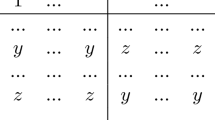Abstract
We call a domain of preference orderings “dictatorial” if there exists no Arrovian (Pareto optimal, IIA and non-dictatorial) social welfare function defined over that domain. In a finite world of alternatives where indifferences are ruled out, we identify a condition which implies the dictatoriality of a domain. This condition, to which we refer as “being essentially saturated”, is fairly weak. In fact, independent of the number of alternatives, there exists an essentially saturated (hence dictatorial) domain which consists of precisely six orderings. Moreover, this domain exhibits the superdictatoriality property, i.e., every superdomain of it is also dictatorial. Thus, given m alternatives, the ratio of the size of a superdictatorial domain to the size of the full domain may be as small as 6/m!, converging to zero as m increases.
Similar content being viewed by others
References
Arrow K (1951) Social choice and individual values. J Wiley, New York
Arrow K (1963) Social choice and individual values. J Wiley, New York
Aswal N, Chatterji S, Sen A (2003) Dictatorial domains. Econ Theory, 22(1): 45–62
Aşan G, Sanver MR (2002) Another characterization of the majority rule. Econ Lett 75(3):409–413
Black D (1948) On the rationale of group decision making. J Politi Econ 56:23–34
Blau JH (1957) The existence of social welfare functions. Econometrica 25:302–313
Bordes GA, le Breton M (1990) Arrovian theorems for economic domains: the case where there are simultaneously private and public goods. Soc Choice Welfare 7:1–17
Ehlers L (2002) Probabilistic allocation rules and single-dipped preferences. Soc Choice Welfare 19:325–348
Fishburn PC, Kelly JS (1997) Super Arrovian domains with strict preferences. SIAM J Discrete Math 10(1):83–95
Gaertner W (2001) Domain conditions in social choice theory. Cambridge University Press, Cambridge
Gibbard A (1973) Manipulation of voting schemes: a general result. Econometrica 41:587–601
Inada K (1964) A note on the simple majority decision rule. Econometrica 32:525–531
Kalai E, Muller E (1977) Characterization of domains admitting non-dictatorial social welfare functions and nonmanipulable voting procedures. J Econ Theory 16:457–469
Kalai E, Muller E, Satterthwaite MA (1979) Social welfare functions when preferences are convex, strictly monotonic and continuous. Public Choice 34:87–97
Kelly JS (1994a) The free triple assumption. Soc Choice Welfare 11:97–101
Kelly JS (1994b) The Bordes-Le Breton exceptional case. Soc Choice Welfare 11:273–281
Klaus B, Peters H, Storcken T (1997) Strategy-proof division of a private good when preferences are single-dipped. Econ Lett 55:339–346
Le Breton M, Weymark JA (2003) Arrovian social choice theory on economic domains. In: Arrow KJ, Sen AK, Suzumura K (eds). Handbook of social choice and welfare: volume 2. Amsterdam, North-Holland
Maskin ES (1995) Majority rule, social welfare functions and game forms. In: Basu K, Pattanaik PK, Suzumura K (eds). Choice, welfare and development. The Clarendon Press, Oxford, p. 100–109
May K (1952) A set of independent, necessary and sufficient conditions for simple majority decision. Econometrica 20: 680–684
Satterthwaite MA (1975) Strategy-proofness and Arrow’s conditions: existence and correspondence theorems for voting procedures and social welfare functions. J Econ Theory 10:187–217
Sen A (1966) A possibility theorem on majority decisions. Econometrica 34:491–499
Vickrey W (1960) Utility, strategy and social decision rules. Q J Econ 75:507–535
Woeginger G (2003) A new characterization of the majority rule. Econ Lett 81:89–94
Author information
Authors and Affiliations
Corresponding author
Rights and permissions
About this article
Cite this article
Ozdemir, U., Sanver, M.R. Dictatorial domains in preference aggregation. Soc Choice Welfare 28, 61–76 (2007). https://doi.org/10.1007/s00355-006-0154-7
Received:
Accepted:
Published:
Issue Date:
DOI: https://doi.org/10.1007/s00355-006-0154-7




